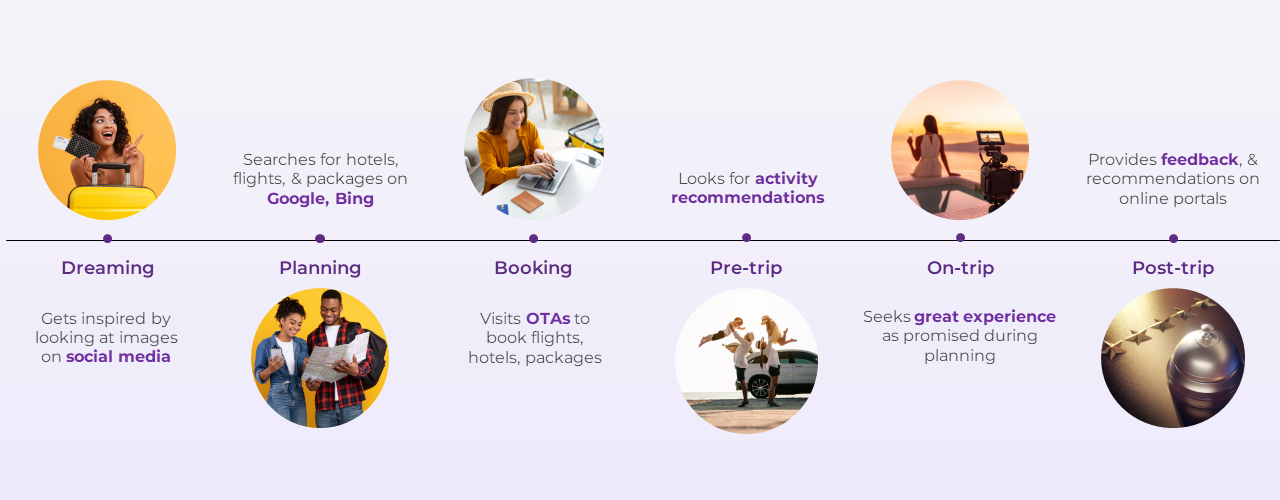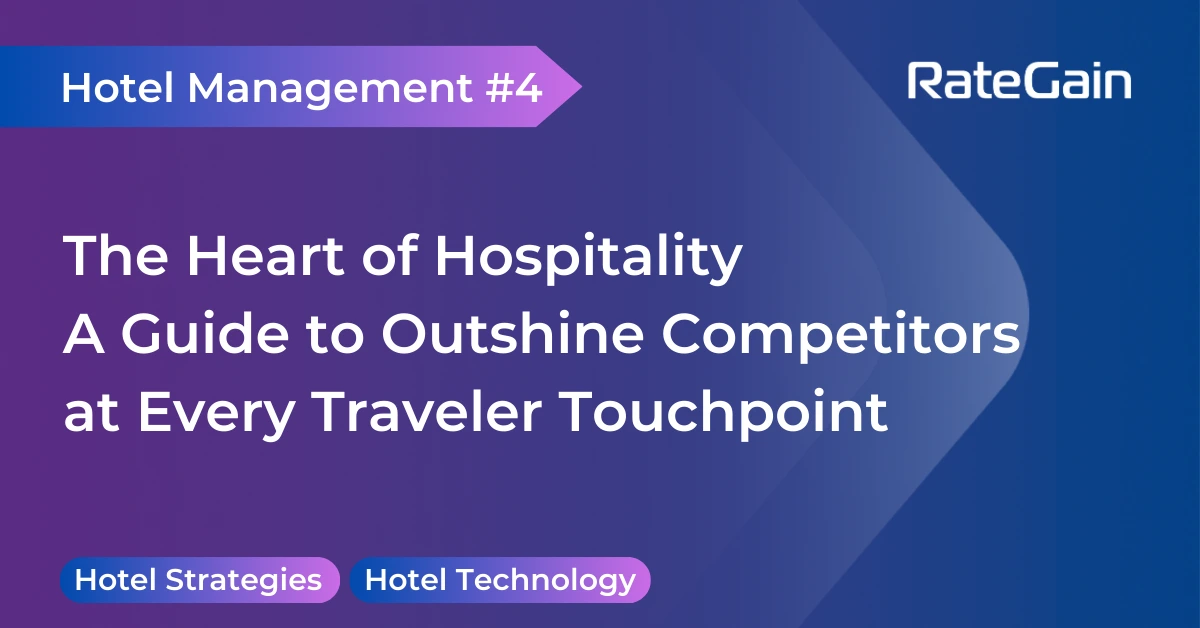Welcome to the world of hospitality, where each traveler embarks on a unique journey of discovery, excitement, and relaxation. In this highly competitive industry, hotels must go above and beyond to capture the hearts of their guests at every stage of their voyage. From igniting wanderlust during the dreaming phase to ensuring unforgettable experiences during the on-trip moments, each touchpoint is an opportunity to create lasting impressions.
Join us as we unravel the secrets to staying ahead in the dynamic hospitality landscape, where innovation, personalization, and exceptional service pave the way to success.
The 6 Stages of Traveler Journey

The traveler journey consists of several distinct stages, each representing a significant phase of their travel experience.
- During the dreaming stage, travelers are in the early stages of planning their trip, seeking inspiration, and exploring potential destinations and experiences.
- In the planning stage, they start narrowing down their options, researching accommodations, activities, and logistics to create their itinerary.
- The booking stage marks the moment when travelers make their reservations and finalize their travel plans.
- Pre-trip, they prepare for their journey, arranging transportation, packing, and anticipating their upcoming adventure.
- On-trip, travelers immerse themselves in the destination, indulging in experiences and creating memories.
- Finally, during the post-trip stage, they reflect on their journey, share their experiences, and begin dreaming of their next adventure.
Each stage is critical, and hotels must seize opportunities to engage and delight travelers at every step of their remarkable journey. And here’s how.

1. Dreaming
During the dreaming stage, travelers are in the early phases of trip planning and seeking inspiration. To capture their attention and stand out from the competition, hotels should focus on personalized marketing, compelling visuals, and virtual tours.
- Personalized Marketing: Understanding the preferences and interests of potential guests is key to delivering targeted marketing content. By utilizing data analytics and guest profiles, hotels can send personalized emails and advertisements that showcase destinations and experiences that align with individual tastes. Personalization not only enhances engagement but also increases the likelihood of conversion.
- Compelling Visuals: In the digital age, captivating visual content is essential to grab the attention of potential travelers. High-quality images and videos of the hotel’s amenities, stunning views, and local attractions can ignite wanderlust and create a desire to explore further.
- Virtual Tours: Virtual tours offer a unique opportunity to immerse travelers in the hotel experience before they even arrive. Through interactive virtual tours, potential guests can explore rooms, public areas, and amenities, gaining a real sense of the ambiance and atmosphere. Virtual tours create a sense of familiarity and comfort, making guests more likely to choose the hotel for their stay.

2. Planning
At the planning stage, travelers are narrowing down their options and conducting research to make informed decisions. Hotels can differentiate themselves by providing transparent pricing, showcasing guest reviews, and offering localized content.
- Transparent Pricing: Transparent pricing is essential to build trust and credibility with potential guests. Clearly stating room rates, additional fees, and taxes upfront eliminates surprises during the booking process. Hotels can also offer flexible cancellation policies and price-matching guarantees, giving travelers the confidence to book directly.
- Guest Reviews: Positive guest reviews and testimonials carry significant weight in the decision-making process. Hotels should actively encourage guests to leave reviews and testimonials and then prominently display them on their website and booking platforms. Authentic and glowing reviews build confidence and reassure potential guests that they can expect a delightful stay.
- Localized Content: Providing destination-specific content and guides can be a game-changer for hotels. Travelers appreciate hotels that go the extra mile to offer local insights, must-visit attractions, and hidden gems. Hotels can create blogs, videos, and interactive maps that highlight the best experiences the destination has to offer. Personalized recommendations based on guest preferences can further enhance the planning experience.

3. Booking
At the booking stage, hotels should streamline the process, offer exclusive deals, and present upsell opportunities to enhance the guest experience.
- User-Friendly Booking Platform: A seamless and user-friendly booking process is crucial to prevent cart abandonment and encourage direct bookings. Hotels should optimize their website and mobile app for a smooth and intuitive experience, making it easy for travelers to find and book their desired accommodation.
- Exclusive Offers: To incentivize direct bookings, hotels can create exclusive offers and packages available only to guests who book directly through their official website or reservation system. Special perks, such as complimentary breakfast, room upgrades, or late check-out, can entice travelers to choose the hotel over other options.
- Upsell Opportunities: During the booking process, hotels can offer upsell opportunities to enhance the guest experience. Upselling can include room upgrades, special amenities, or bundled packages that add value to the stay. Personalizing upsell offers based on guest preferences can lead to higher conversion rates.

4. Pre-Trip
Before guests arrive, hotels can maintain their excitement and reassure them of a memorable stay through effective pre-arrival communication, virtual concierge services, and engaging social media interactions.
- Pre-Arrival Communication: Sending personalized pre-arrival emails is a fantastic way to build anticipation and create a positive first impression. Hotels can use these emails to thank guests for their booking, provide essential details about the stay, offer additional services or upgrades, and extend warm greetings.
- Virtual Concierge Services: Virtual concierge services allow guests to plan and customize their itinerary before arrival. This can include booking spa treatments, reserving tables at restaurants, arranging transportation, and even requesting specific room preferences. Virtual concierge services enhance guest convenience and elevate the pre-trip experience.
- Social Media Engagement: Social media platforms offer an excellent avenue to connect with guests before they arrive. Hotels can actively engage with guests by responding to queries, providing destination tips, and sharing user-generated content from previous visitors. Social media interactions humanize the hotel’s brand and create a sense of community.

5. On-Trip
Once guests are on-site, hotels can continue to impress by providing personalized welcomes, unique amenities, and mobile concierge services.
- Personalized Welcome: First impressions matter, and a personalized welcome sets the tone for a memorable stay. Hotel staff should greet guests by name, offer a warm smile, and provide a brief overview of the hotel’s facilities and services. Personal touches, such as knowing guests’ preferences for room location or amenities, go a long way in making guests feel valued.
- Unique Amenities: Surprise and delight guests with thoughtful and unexpected amenities that cater to their interests or needs. Whether it’s a welcome gift, a handwritten note, or a curated local experience, providing unique amenities shows genuine care for guests’ comfort and enjoyment.
- Mobile Concierge: Equipping guests with a mobile concierge app or chatbot enhances their stay by providing instant assistance and recommendations. From ordering room service to booking tours and activities, a mobile concierge app simplifies guest interactions and enables seamless communication with the hotel staff.

6. Post-Trip
After guests check out, hotels can continue fostering guest loyalty by requesting feedback through post-stay surveys, offering special incentives for returning guests, and engaging with guests on social media.
- Post-Stay Surveys: Post-stay surveys are valuable tools for hotels to gather guest feedback and gain insights into their experience. Hotels should promptly send post-stay surveys to guests and incentivize participation with special offers or loyalty points. Analyzing feedback helps identify areas for improvement and showcases the hotel’s commitment to delivering exceptional service.
- Special Offers for Returning Guests: To encourage repeat visits, hotels can offer exclusive discounts or perks to past guests. Recognizing and rewarding loyal customers strengthens the hotel-guest relationship and fosters brand advocacy.
- Social Media Engagement: Engaging with guests post-stay on social media platforms strengthens the hotel’s relationship with its guests and keeps them connected with the brand. Hotels can share user-generated content, such as guest photos or reviews, and respond to comments and messages promptly. Social media engagement promotes positive word-of-mouth and builds a community of satisfied guests.
Conclusion
Throughout the traveler journey, each stage presents an opportunity for hotels to differentiate themselves and create a lasting impression. By understanding the needs and preferences of guests, leveraging technology and data analytics, and delivering exceptional experiences, hotels can stay competitive and thrive in the dynamic hospitality industry. Embracing a guest-centric approach and adopting innovative solutions will undoubtedly pave the way for success in an increasingly competitive landscape.
 Deutsch
Deutsch Português
Português Italiano
Italiano Espanol
Espanol čeština
čeština ไทย
ไทย Français
Français


